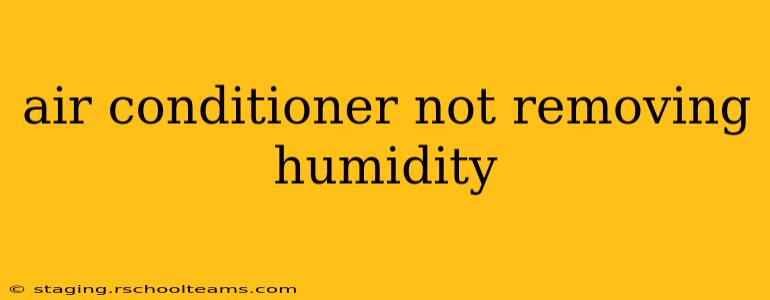Is your air conditioner struggling to remove humidity from your home, leaving you feeling sticky and uncomfortable even when the temperature is cool? This is a common problem with several potential causes. This guide will walk you through troubleshooting steps and solutions to get your AC back to dehumidifying efficiently.
Why Isn't My AC Removing Humidity?
This is often the first question homeowners ask. There are several reasons why your air conditioner might not be effectively removing humidity:
- Low Refrigerant: Refrigerant is crucial for the cooling and dehumidification process. Low refrigerant levels significantly impact the AC's ability to absorb moisture from the air. A low refrigerant charge will result in poor cooling and reduced dehumidification.
- Clogged Air Filter: A dirty air filter restricts airflow, reducing the AC's efficiency. Restricted airflow prevents the unit from properly absorbing moisture from the air. Regular filter changes are essential.
- Frozen Evaporator Coil: Ice buildup on the evaporator coil restricts airflow, inhibiting the AC's ability to dehumidify. This often occurs due to low refrigerant, restricted airflow, or a dirty air filter.
- Incorrect Thermostat Settings: Using the "fan only" setting or setting the temperature too low can impact dehumidification. The AC needs to run in cooling mode to effectively remove moisture.
- Leaking Ducts: Leaky ductwork reduces the airflow and efficiency of your entire HVAC system, impacting both cooling and dehumidification capabilities. Air escaping from leaks won't be cooled or dehumidified.
- Oversized Air Conditioner: A unit that's too large for the space cools down too quickly, not allowing enough time to remove humidity. It cycles on and off frequently, preventing efficient dehumidification.
- Undersized Air Conditioner: Conversely, a unit too small for the space struggles to cool and dehumidify adequately, running constantly and still failing to reach the desired comfort levels.
How Can I Fix My Air Conditioner's Humidity Problem?
Let's address those potential issues and how to resolve them:
1. Check and Change the Air Filter:
This is the easiest and most frequently overlooked solution. A clogged filter restricts airflow, impacting the AC's performance. Replace your filter with a clean one according to the manufacturer's recommendations.
2. Inspect the Evaporator Coil for Ice:
If you see ice buildup, don't attempt to defrost it yourself. This points to a more serious underlying problem, likely low refrigerant or restricted airflow, requiring professional attention.
3. Verify Refrigerant Levels:
Low refrigerant levels require professional service. A qualified HVAC technician can identify leaks, recharge the system, and ensure optimal operation. Never attempt to handle refrigerant yourself, as it's under high pressure and can be dangerous.
4. Check Your Thermostat Settings:
Make sure your thermostat is set to "Cool" and not "Fan Only." Adjust the temperature to a comfortable level; setting it too low might cause short cycles, hindering dehumidification.
5. Inspect for Duct Leaks:
Look for signs of air leakage around ductwork, particularly in attics, crawl spaces, and closets. While you might not be able to fix major leaks yourself, you can seal smaller gaps with duct tape or mastic sealant. For significant leaks, call an HVAC professional.
6. Consider the Size of Your Air Conditioner:
If you suspect your AC is either oversized or undersized for your space, consulting with an HVAC technician is recommended. They can assess your cooling needs and recommend the appropriate unit size.
7. Is it the Right Type of AC?
Some AC units are better at dehumidification than others. For example, heat pumps might not be as effective at dehumidifying as traditional air conditioners. Understanding your AC's capabilities is important.
When to Call an HVAC Technician?
If you've checked the air filter, thermostat settings, and haven't found any obvious problems, it's time to call a qualified HVAC technician. They possess the expertise and tools to diagnose more complex issues like refrigerant leaks, evaporator coil problems, or ductwork issues. Don't delay; ignoring these problems can lead to costly repairs down the line.
By following these steps, you can often resolve the issue of your air conditioner not removing humidity. However, remember that professional help is crucial when dealing with refrigerant or other complex HVAC system components. Maintaining your AC regularly can prevent many of these problems from arising in the first place.
